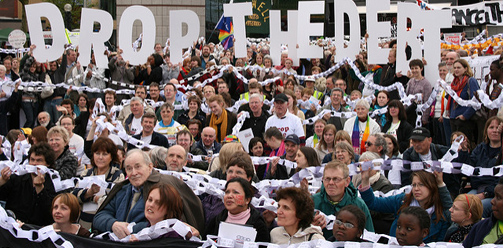The SDGs have highlighted the need for a new paradigm that links economic growth to broader goals of justice and sustainability, but there’s been less thinking on how this emerges in practice, and what the implications are for policymakers, private sectors leaders or civil society activists. A new IDS project is looking for examples of where people are empowered to have their say in their economic future, whether in economic policymaking or grassroots economic alternatives – can you help?

The UN’s Sustainable Development Goals (SDGs) set a new universal standard for development that not only contributes to economic progress, but does so in a way that links social, economic and sustainability goals, and which “leaves no one behind”.
So, while there is an emerging recognition of the need for a new paradigm that links economic growth to broader goals of justice and sustainability, there is less thinking on how this emerges in practice, and what the implications are for policymakers, private sectors leaders or civil society activists.
Certainly, there are some better known models or ways of organising economic activity which have been more inclusive, such as worker cooperatives or participatory budgeting. Participatory budgeting, for example, supports citizens to discuss critical local issues with each other and determine budgetary preferences, which then have a real impact on local government allocations.
But newer experiments are also emerging, in response to both social and technological changes, such as the platform cooperative economy which employs the power of technology to enable cooperatively owned online marketplaces, or, where drivers, cleaners or nurses, for example, offer their work for fair prices on a platform where they’re in charge.
Other examples include Local Exchange Trading Schemes (LETS) are alsowhich are rooted in alternative forms of exchange and sometimes also alternative currencies. In the Pumarejo neighbourhood of Seville, for example, the Puma is an alternative currency designed to support collective decision-making, localised consumption and the redeployment of under-utilised skills and competencies.
New IDS collaboration with the Economic Advancement Programme of the Open Society Foundations
A new project by IDS, in collaboration with the Economic Advancement Programme of the Open Society Foundations, aims to explore what constitutes meaningful participation in the economic sphere and how it might be enabled.
As part of our research on participation in economic advancement, we are looking for more examples like this – and we need your help!
We are inviting you to participate in this project by sharing examples you know where people have a real voice in economic decisions. We are also interested in what hasn’t worked, and the learning that has been taken from this experience.
Can you help us?
Are you aware of examples where people are empowered to have a say in their economic future?
Please share your examples in this Google Form.
In particular, we want to understand participation in three areas:
- Alternative forms of economic management that enable workers, consumers, communities, farmers, for example, to have a voice.
- Citizen voice in government economic policymaking
- Grassroots economic alternatives where people claim ownership over economic processes that affect their lives
The overall aim is to shed light on these interventions and to learn from them, helping to frame future interventions.
Download the full open call (PDF), including more in-depth information about project concepts and examples already identified.
Image: Jubilee human pie chart. Credit: Paul Miller – Flickr (CC BY 2.0)
